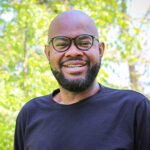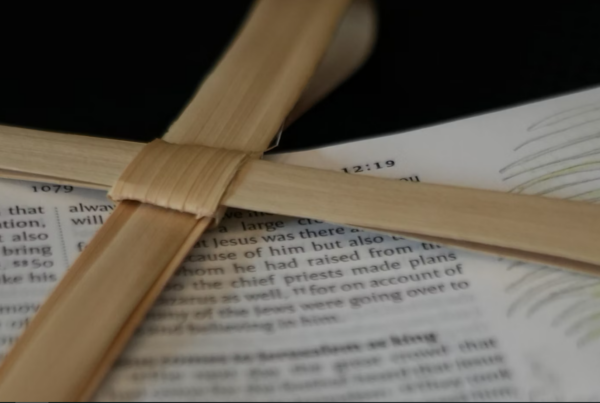I sn’t it our human desire to experience, express, and engage in spaces where we feel that we can “be” without any reservation? How do we arrive at such spaces? Let’s focus on belonging and diversity to see how we might arrive at the “telos”—fulfillment—of the Revelation 7:9 vision.
The fulfillment of Revelation 7:9
Revelation 7:9 paints an enthusiastic picture of the multitude of every tribe and nation worshiping together, a gathering of God’s family:
“After this I looked, and there was a great multitude that no one could count, from every nation, from all tribes and peoples and languages, standing before the throne and before the Lamb, robed in white, with palm branches in their hands.”
The church today is looking for the fulfillment of this vision that John shares. We are on a journey of reconciliation, both between God and humankind. And this vision of every nation, tribe, and language together is our “telos”—a Greek term for an end, fulfillment, completion, goal, or aim.
But there are plenty of barriers to building this kind of community—classism, sexism, ableism, and racism, to name a few—so there are two words I want to focus on for a moment.
What do we mean by “belonging” and “diversity”?
Building community begins with belonging. “Belonging” refers to the feeling of being accepted, valued, and included in a community or group. A sense of belonging is important for individuals’ mental, emotional, and spiritual well-being, and it also contributes to social cohesion and harmony. When people feel like they belong, they are more likely to participate in community activities, engage in positive interactions with others, and contribute to the common good.
How to Create a Sense of Belonging and Invite Everyone to Contribute Their Spiritual Gifts
“Diversity” refers to the differences in people’s race, ethnicity, culture, gender, age, ability, religion—any characteristics that make them unique. Diversity is important because it brings different perspectives, skills, and experiences to the table, leading to more innovative solutions and a broader understanding of the world.
Why Intentional Diversity Matters and How to Pursue It In Your Church
Belonging and diversity are interconnected concepts that play a crucial role in creating a healthy and inclusive society that is reflective of Revelation 7:9. When we promote and celebrate diversity, we create a sense of belonging for all members of the community, regardless of their differences.
However, achieving true belonging and diversity requires intentional efforts and actions. It means recognizing and valuing everyone’s unique qualities and creating a safe, inclusive environment where everyone can thrive. It also means addressing systemic barriers and biases that prevent certain groups from fully participating and thriving in society. By embracing and celebrating diversity and promoting a sense of belonging for all, we can create a more equitable and just world where everyone has the opportunity to reach their full potential.
Pursuing the Revelation 7:9 “telos” today
Throughout Scripture, we see examples of Jesus’s engagement with people. As a child, I was always intrigued by the ways Jesus encountered those in his path—the fishermen, the Samaritan woman, the priests at the synagogue, the tax collectors, the Pharisees. For the lost, the broken, and the hurting, Jesus’s example of love shows us that regardless of our circumstances we are loved and embraced.
Growing up as a Black person in a predominantly white city presented many encounters with people who were different from me. We came from different backgrounds and cultural spaces. I became keenly aware of this in the church. I was a child pianist and organist in what was at the time the only Black church in the city. While learning how to play pipe organ at the white church, I was exposed to an expression of worship that was very different from what I was accustomed to.
My curiosity grew as I heard songs in that space that were the same songs we sang at the Black church. But they sounded different, and they felt different. I often wondered how church could have two vastly different expressions. Over time, I developed a love and a greater appreciation for my brothers and sisters that engaged in this expression, even though it was different from what I was used to. But I longed for something more, something that wasn’t Black or white. I longed for something that reflected the global family of God.
Thus began a journey of learning and listening. I soon realized that what was missing between us was a common understanding of the purpose behind our sound. Perhaps it was an opportunity to learn something deeper and blaze a new trail.
How could we create an expression that made space for all of us to engage in community together and truly and equally reflect our unique voices and cultural expressions? Aren’t there too many barriers for that to be realized? After all, Rev. Dr. Martin Luther King Jr. stated that the 11:00 hour on a Sunday morning is the most segregated hour in the week. Not much has changed now, in 2023, and the same could be said for our worship gatherings today. And that begs the question: is it even worth trying?
Let’s answer the question I posed above—can a multicultural, vibrant, Spirit-inspired, sustained, and filled worshiping community truly exist? Can the barriers that divide and confuse truly be demolished?
I can confidently say a resounding and solid yes to that question. Not because I’ve read a case study or sat in a boardroom crafting a strategy, but because I have witnessed and enjoyed this rare, unique, and incomparable expression of the Kin-dom of God—around my kitchen table, on college campuses, and in city centers. A Revelation 7:9 picture is not only a longed-for vision for the future, but it is being realized here and now—a remnant of free spirits willing to take risks, humble themselves, and meet at the table of reconciliation at the foot of the cross where there is neither “Gentile” nor “Greek” nor “Jew,” but one in Christ Jesus (Galatians 3:28).
As God’s covenant people, the narrative of belonging is woven into our story from Genesis to Revelation. And the Creator of heaven and earth, the Author of life, and the Giver of every good gift beckons the church to explore mindset shifts and practical action steps toward a more just and diverse future where all people truly feel a sense of deep and unconditional belonging.

Rev. Jeremy Simpson
Rev. Jeremy Simpson serves as the director of diversity and belonging for the Reformed Church in America. He is a lifelong musician and community ministry advocate who employs the arts alongside his work of equity, justice, inclusion, and belonging. You can follow more of his work at www.pursuitcommunity.info.



